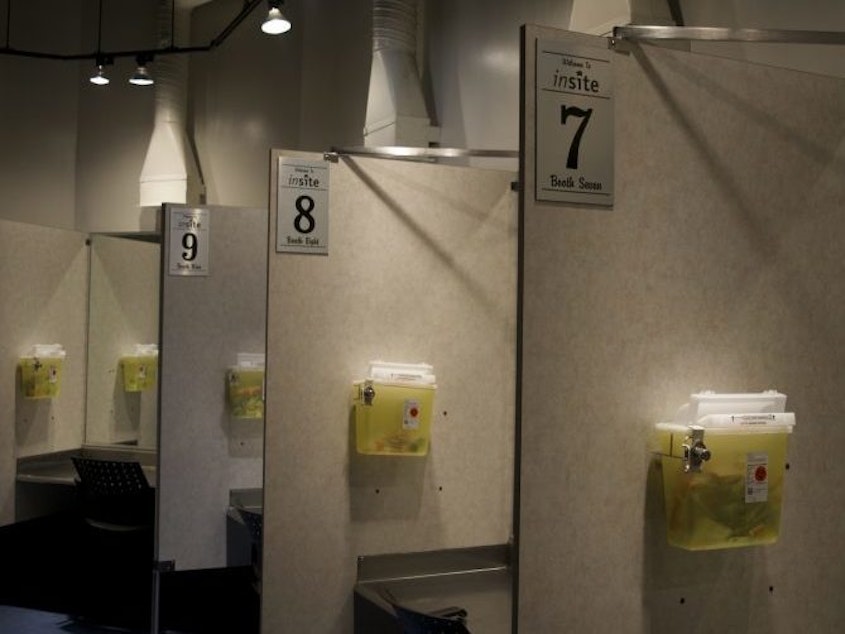Drug injection sites score a win in WA Supreme Court

The initiative would have gutted funding for safe injection sites.
The ruling upheld a lower court decision that kept Initiative 27 off the ballot in King County.
The measure would have prevented the use of public money to pay for the drug use sites, where people can use heroin and other drugs under medical supervision and be revived if they overdose. It would also have banned anyone from operating a building for the use of such a site.
The Supreme Court, however, said that the initiative would interfere with the budget authority of the King County Council and the county health board.
"The ultimate goal of I-27 is to eliminate the funding for" safe injection sites, the Supreme Court said.
It left open the possibility that a future initiative could propose banning the sites statewide. Joshua Freed, who chaired the I-27 campaign, said his group must now confer on whether to pursue that.
Freed said he was disappointed, but not surprised, by the ruling.
“Sadly, the state Supreme Court decided to leave the control in the hands of elected officials who in Seattle are starting to go off on a tangent on their own with pretty extreme choices," he said.
“Eighty percent are against heroin injection sites in east King County and 80 percent are for it in Seattle," he said. Freed's group Safe King County wants funding to focus on treatment.
Attorney Phil Talmadge represented the initiative backers before the high court.
Talmadge said that, just as local cities had the ability to opt out of hosting the sites, King County voters should also have been able to consider the issue.
“The argument we’re talking about is that voters are too stupid to make decisions about public health-related issues," he said.
"They’re not. They can address those issues appropriately and should have had an opportunity to make a decision on this issue as well.”
Supporters of the safe injection sites, like Mark Cooke with the ACLU of Washington, said with this case settled, they want elected officials to get the sites up and running.
“With this decision behind us now, I think advocates would call upon our elected officials in Seattle and King County to move forward as fast as possible to implement the 2016 Opiate Task Force recommendations, including opening a safe consumption space,” Cooke said.
The task force recommended piloting two sites in King County, including one in Seattle. Last June, Seattle officials briefed the City Council on plans for a mobile injection site that could operate somewhere downtown. Seattle has allocated $1.4 million in one-time funding to develop the site in the latest budget.
Councilmember Teresa Mosqueda hailed the ruling and said she will push ahead.
“I’ll be working in 2019 to engage community members, including those who have concerns and fears, to build a Seattle that is safer for all of our residents," she said.
In a statement, Mayor Jenny Durkan greeted the Supreme Court ruling as "the right decision for Seattle." But she implied that the city's supervised injection site is on hold until the city secures operating funds.
She cited a task force recommendation that the sites would need holistic services "to address the systemic issues associated with opioid substance use disorder."
She said such services would cost $2.5 million each year.
Knoll Lowney, an attorney for Protect Public Health, which supports the sites, said it’s still possible a statewide initiative banning the sites could be eligible for the ballot, but local initiative authority is very narrow.
“I’m very confident that public health matters are beyond the scope of the local initiative process,” says Lowney.
Durkan and City Attorney Pete Holmes have said they will continue to work for safe injection sites despite threats of pushback from federal officials.
King County Councilmember Jeanne Kohl-Welles supports the sites but said a state initiative, rather than a local one, would be a valid route to pursue the question. “If the group that has worked on Initiative 27 wants to take this to the state, through a citizen’s initiative, I think that’s the appropriate place and that’s clearly allowable to do," she said.
But she echoed Mosqueda's statement that potential sites would only open after extensive public outreach. She said, "It would be a very methodical process to get the neighbors’ cooperation and have a site located where there are a large number of people in need.”





